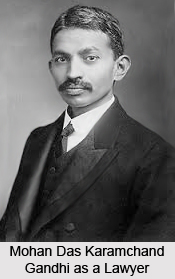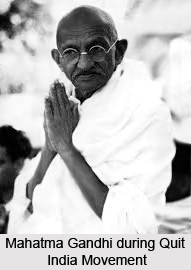 Mohandas Karamchand Gandhi, popularly known as Mahatma Gandhi, led the nation through the Indian freedom struggle with his ideologies of `Ahimsa` or non-violence, Civil Disobedience Movement and Swaraj.
Mohandas Karamchand Gandhi, popularly known as Mahatma Gandhi, led the nation through the Indian freedom struggle with his ideologies of `Ahimsa` or non-violence, Civil Disobedience Movement and Swaraj.
Mahatma Gandhi`s principles believed in truth and non-violence as the key points to lead a moral and peaceful life. Gandhi always believed in simple living and high thinking. For him, service to mankind is service to God. His entire thinking one can feel in his writings, especially in his auto biography, `My Experiments with Truth`. He had written several books and articles, which are mainly in Gujatrati language.
He was the leader of Indian National Congress and initiated the Satyagraha movement. He was honoured the title `Mahatma`, meaning `great soul`, by Rabindranath Tagore. Mahatma Gandhi is known as Father of Nation and played a key role in the Indian freedom struggle. Mahatma Gandhi`s main contribution lay in the fact that he bridged the gulf between the intelligentsia and the masses and widened the concept of `Swaraj` to include almost every aspect of social and moral regeneration. Paying tribute to Mahatma Gandhi on his death, famous scientist Albert Einstein said, `Generations to come will scarce believe that such a man as this walked the earth in flesh and blood`.
Early Life of Mahatma Gandhi
 Mohandas Karamchand Gandhi was born on 2nd October 1869, Porbandar, India in a Hindu family. Since his child hood he has displayed all his great qualities, which he had inherited from his mother. At the age of 13, he married Kasturbai Makhanji and had four sons. He pursued a degree in Law from the University of London. However, Gandhi failed to manage law practise properly in India. And thus went to South Africa with a one year contract job offer from Dada Abdullah and Co.
Mohandas Karamchand Gandhi was born on 2nd October 1869, Porbandar, India in a Hindu family. Since his child hood he has displayed all his great qualities, which he had inherited from his mother. At the age of 13, he married Kasturbai Makhanji and had four sons. He pursued a degree in Law from the University of London. However, Gandhi failed to manage law practise properly in India. And thus went to South Africa with a one year contract job offer from Dada Abdullah and Co.
Mahatma Gandhi in South Africa
During Mohandas Karam Chand Gandhi`s one year of job in South Africa, he had not only came to know about the racism but also been treated badly. Indians were discriminated from the citizenship of South Africa. Gandhi fought for equal justice and founded an organization as Natal Indian Congress. There, initially he used `Satyagraha` and `non-violence` as his ultimate weapon. But finally, after punishments and imprisonments, peacefully Gandhi made South African Government compromise.
Mahatma Gandhi in Indian Freedom Struggle
After returning from South Africa, Mohandas Karamchand Gandhi settled in Ahmedabad near Sabarmati River. Gandhi took active participation in the activities of Indian National Congress and launched `Non Cooperation Movement` and `Civil Disobedience` campaign against the British. Gandhi focused himself in reforming villages, as he believed that rural India needed most of his support. Mahatma Gandhi also introduced `Khadi`, which generated employment opportunities and gave a new identity to Indian craft. He fought for `Dalits`, the untouchables, and also for the cause of Hindu-Muslim Unity. He gave the new name, Harijan or people of God to Dalits. Gandhi started the historic Dandi March against the tax imposition on salt. Gandhi also launched the `Quit India Movement` against the tyranny of the British Rule. He was affectionately known as `Bapu`.
Mahatma Gandhi and Indian Independence
 After the World War II, Indian leaders and British decided to discuss about Indian freedom and their future. But the Indian National Congress and the Muslim League were never united. Gandhi opposed this proposal of England but the Congress broke from Gandhi and supported the proposal. Mahatma Gandhi had a major role in bringing freedom for India, but he did not seem satisfied with independent India, as it ruined the Hindu-Muslim Unity and divided the nation, as India and Pakistan.
After the World War II, Indian leaders and British decided to discuss about Indian freedom and their future. But the Indian National Congress and the Muslim League were never united. Gandhi opposed this proposal of England but the Congress broke from Gandhi and supported the proposal. Mahatma Gandhi had a major role in bringing freedom for India, but he did not seem satisfied with independent India, as it ruined the Hindu-Muslim Unity and divided the nation, as India and Pakistan.
Assassination of Mahatma Gandhi
Gandhi was shot and killed by Nathuram Godse on January 30th 1948, while he was going to approach a prayer meeting. Nathuram Godse blamed Gandhi for the partition of India.
In 1996, the Government of India introduced the Mahatma Gandhi series of currency notes in rupees 5, 10, 20, 50, 100, 500 and 1000 denomination. Today, all the currency notes in circulation in India contain a portrait of Mahatma Gandhi. In the United Kingdom, there are several prominent statues of Gandhi. January 30 is commemorated in the United Kingdom as the National Gandhi Remembrance Day.






